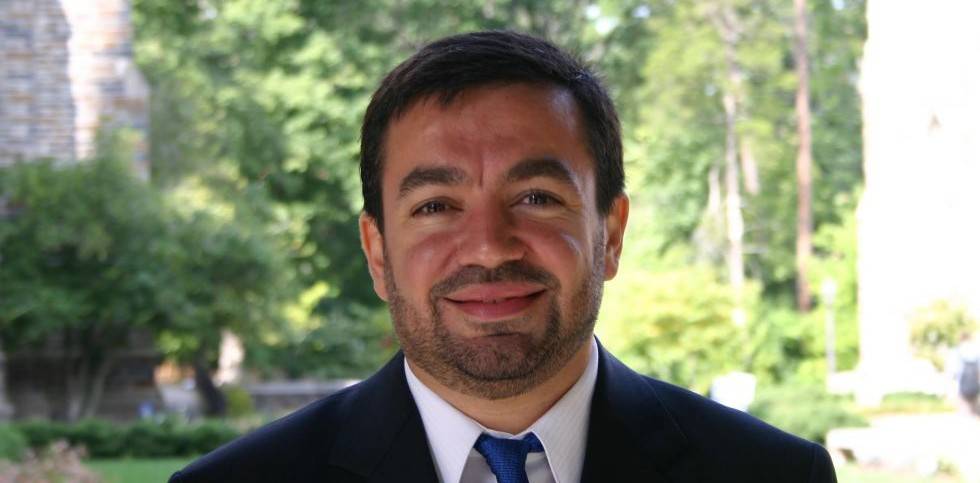Interfaith Insight - 2024
Permanent link for "Remembering previous evil as well as heroic deeds" BY DOUGLAS KINDSCHI, SYLVIA AND RICHARD FOUNDING DIRECTOR, KAUFMAN INTERFAITH INSTITUTE, GVSU on May 13, 2024
Originally Published 2018
Much has been written about the fact that a country like Germany, which was predominantly Christian, engaged in the horrendous events around the Holocaust. While we can blame Hitler and the government of the Third Reich, the fact remains that thousands of ordinary citizens in that country and surrounding countries participated in or at least watched the genocide being carried out.
The Catholic Church has been a target for complicity during that time, but there are many examples of individuals who have dedicated their lives to a type of repentance through their actions in seeking truth and telling the stories of “Never Forget.” I recall a few decades ago visiting Auschwitz and meeting a young German Catholic priest who had dedicated his life to living near that death camp and telling the story of the atrocities committed there.
A few years ago, we heard from the FrenchCatholic priest, Father Patrick Desbois, who also devoted his life to researching the stories of what he calls the “Hidden Holocaust” in Eastern Europe during World War II. For over two decades he has tracked down the sites of hidden graves and interviewed witnesses who describe the horrors of more than 70 years ago, when a total of more than a million Jews, babies, children, men, women, and elderly were shot and buried in unmarked ditches throughout Eastern Europe. His research has identified more than 2,000 such execution sites.
In 2004 he created the international organization Yahad-In-Unum (“Together as One”) with support from the Vatican and praise from Pope Francis. His research and important efforts are documented in his book, The Holocaust by Bullets: A Priest's Journey to Uncover the Truth Behind the Murder of 1.5 Million Jews .
Thanks to efforts by the Jewish Federation of Grand Rapids, the Diocese of Grand Rapids, the Catholic Information Center, and other co-sponsors including the Kaufman Interfaith Institute, Father Desbois spoke in Grand Rapids at the Catholic Information Center in 2018.
Another story on the same topic is told by Abdullah Antepli, thefirst imam at Duke University and Muslim leader whose chapter, “Never Again: A Muslim Visits the Nazi Death Camps,” appears in the book, My Neighbor’s Faith: Stories of Interreligious Encounter, Growth, and Transformation .” He tells of his trip along with a small group of American Muslims to four Nazi concentration camps in Germany and Poland.
Antepli writes, “The trip came as an unexpected answer to many years of personal prayer. As a recovering anti-Semite, who is deeply pained by current Jewish-Muslim relations … I knew I needed to develop a deeper understanding of the Shoah and its impact on several generations of Jews. As an imam and chaplain working actively to help heal the wounds between Jews and Muslims, I had to open myself more to the pain of my Jewish brothers and sisters.”
While he says that he has read books and seen films about the Holocaust, it was much more powerful to visit the actual sites and to “actually walk in the footsteps of millions of brutalized and murdered people.” He reflected on “all the people who participated directly and indirectly in this demonic campaign to exterminate the Jewish people and others considered marginal and unworthy of humane treatment.”
Antepli also shares the official statement that came from the group of imams who participated in this visitation. It begins with a quote from the Qur’an, “O you who believe, stand up firmly for justice as witnesses to Almighty God.” (4:135) The statement continues, “In Islam, the destruction of one innocent life is like the destruction of the whole of humanity and the saving of one life is like the saving of the whole of humanity.” (Qur’an 5:32) While bearing witness to the millions who perished fromsuch senseless and cruel murder, the statement also recognizes that many Muslims did heroic acts in protecting and saving the lives of Jews.
Yad Vashem, the Holocaust Remembrance Center in Jerusalem, recognizes many from Europe who risked their lives to help protect those persons persecuted. Their program, “Righteous Among the Nations” honors non-Jews who risked their lives to save Jews during the holocaust, including Muslims from Albania, Bosnia, Macedonia, Turkey, and Eastern Europe, who acted heroically at the time. While there has not been much publicity about these “Righteous Muslims,” their stories need to be told.
In Skopje, Macedonia, while the city was under German control, Dr. Todo Hadzi-Mitkov sheltered the Jewish Mois Frances and his family. When the conditions became more dangerous, they arranged false papers showing the Frances family to be Muslim and then taken by horse and cart out of Skopje to Albania, where they stayed with another Muslim family until Skopje was liberated.
In Bosnia, among the Muslim Righteous, the Hardaga family sheltered the Jewish Kavilo family when the Nazi forces occupied that area. In an interesting turn of events 50 years later, during the Bosnian Civil War, the Kavilo family was instrumental in getting permission for the Hardaga family to travel to Israel and escape the continuous bombing of Sarajevo.
These stories of Jewish-Muslim friendships and life-saving actions are now threatened by the emerging narrative that the two religions are at odds. We must also remember and celebrate the actions taken, often at great risk, to save the lives of those with whom we do not share a religious tradition. We need to remember our common humanity and do what is right for all persons made in God’s image.


